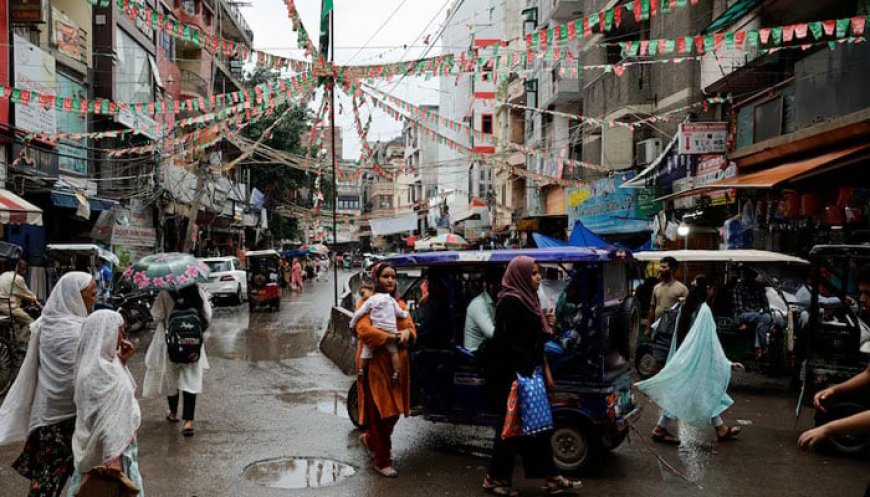Muslims segregate to seek security in Modi's India

1. Experts blame increase in anti-Muslim hate speech with BJP politicians emerging as key factor in trend
**Muslims in New Delhi Seek Safety in Enclaves Amid Rising Hate Speech and Sectarian Violence**
**NEW DELHI:** Muslims in India's capital, New Delhi, have increasingly moved into Muslim-majority enclaves, seeking safety in numbers following the 2020 riots and growing anti-Muslim rhetoric.
Nasreen and her husband, Tofik, are one such couple. They once lived in Shiv Vihar, a developing neighborhood in northeast Delhi. However, during the February 2020 riots, Tofik was pushed from the second floor of their building by a mob, as detailed in a police report he filed from the hospital days later.
Though he survived, Tofik now walks with a limp and could only return to selling clothes on the streets after nearly three years of recovery. Soon after the riots, the couple relocated to Loni, a remote area with limited infrastructure but a significant Muslim population. "I feel safer among Muslims," said Tofik, who, like his wife, goes by one name.
Interviews with about two dozen residents confirmed the growing tendency of Muslims to cluster away from Hindu-majority areas. This migration has led to overcrowding in neighborhoods like Jamia Nagar, long known as a refuge during communal violence.
Though no official data tracks segregation trends, political anthropologist Raphael Susewind from the London School of Economics says segregation has grown significantly over the past decade. He attributes the trend to rising Islamophobia under Prime Minister Narendra Modi’s Bharatiya Janata Party (BJP), which came to power in 2014.
Several Muslim leaders echoed this view, saying the 2020 riots were a major driver. The violence, which injured over 200 people and killed at least 53—mostly Muslims—erupted after protests against a new citizenship law perceived to favor non-Muslims. A Delhi government report blamed the riots on speeches by BJP leaders inciting violence, though the BJP denied the allegations.
**Overcrowded Enclaves and Social Impact**
Jamia Nagar, situated behind Jamia Millia Islamia University, has become a hub for displaced Muslims. Despite a construction boom, space is running out, say local leaders and real estate agents. "No matter how brave a Muslim might be, they feel they have to move because if a mob comes, how brave can you really be?" said Raes Khan, a real estate agent in South Delhi.
Nasreen, now in Loni, recalls the betrayal she felt by her former neighbors. "I will never go back. I have lost faith in them," she said, referring to neighbors she believes participated in the mob attack on her husband. Reuters could not independently verify her claim, but Sam Sundar, a Hindu resident of their old neighborhood, acknowledged the aftermath: "Very few Muslims now live in the area. This is not a good thing."
Malika, another former Shiv Vihar resident, lost her husband in the riots. Now, she divides her time between a small room in a Hindu-majority area where she finds occasional work and her new home on the outskirts. "Here I am afflicted with poverty, there I’m afflicted with insecurity," she said.
**Decline in Public Services and Educational Access**
Muslim enclaves tend to lack public services, such as water and quality schools. A 2023 study by economists from the UK, U.S., and India found that children in Muslim-majority areas often face educational disadvantages. Nasreen’s daughter, Muskan, dropped out of her new school, citing poor resources and missing her former classmates.
**Rising Hate Speech and Political Tensions**
Although the Indian government’s National Crime Records Bureau reports a decline in communal riots, independent data tells a different story. The Center for the Study of Organised Hate, a Washington-based think tank, recorded a significant increase in anti-Muslim hate speech, from 255 incidents in early 2023 to 413 in the second half of the year. The BJP and its affiliates were frequently linked to the surge.
PM Modi has also drawn criticism for his divisive rhetoric. During his campaign for a third term, he referred to Muslims as "infiltrators" and suggested they were a demographic threat. BJP officials, however, maintain that Modi's remarks were directed at undocumented immigrants, not Indian Muslims. They also argue that Muslims benefit from government anti-poverty programs.
**Upper-Class Muslims Also Moving to Enclaves**
The trend toward self-segregation is not limited to poorer Muslims. Wealthier Muslim families, once comfortable in mixed communities, are also relocating to enclaves, driven by fear for their safety. "It’s better to live in separate areas rather than facing a constant threat to life and property," said Mujahid Nafees, a Muslim leader from Gujarat, home to India's largest Muslim enclave.
For many Muslims, the choice between safety and economic opportunity has become increasingly stark. As Tofik summarized: "We are safer here, but at what cost?"


















































